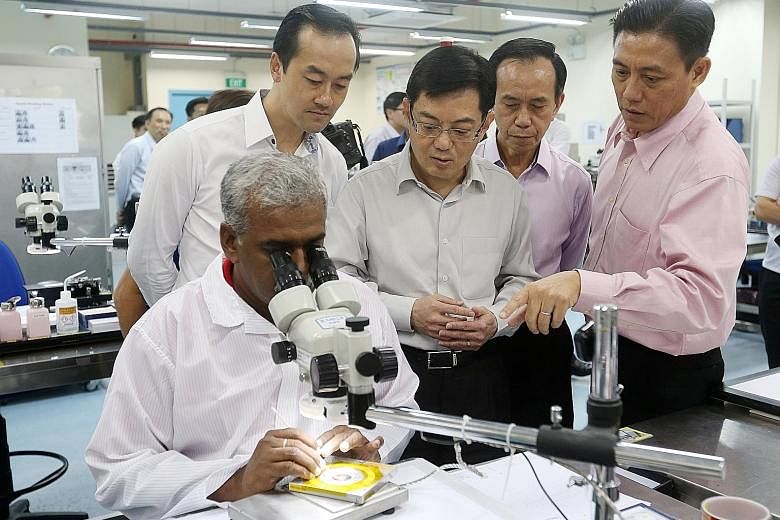Greater impetus for innovation
Several MPs spoke about the need for innovation and entrepreneurship to become bigger drivers of the economy.
Mr Liang Eng Hwa (Holland-Bukit Timah GRC) and Non-Constituency MP Daniel Goh both suggested that the heartland can become a more conducive environment for budding businesses. Mr Liang said Housing Board shops can be converted into workspaces for prospective start-ups, while Mr Goh said the Government can consider decentralising industrial districts and science parks to spread them to housing estates.
Other MPs noted that technology was rapidly changing industrial practices and companies that fail to adapt will fold eventually, no matter how much help they get.
Nominated MP Thomas Chua cited Finance Minister Heng Swee Keat's March 24 Budget speech: "There is no such thing as a sunset industry, only sunset thinking."
Mr Chua lauded the local food processing, furniture manufacturing and garment fashion industries - once written off as dying trades - for turning things around.
Minister in the Prime Minister's Office Chan Chun Sing identified construction, retail, and food and beverage as sectors lagging in Singapore's productivity push. He said the Government will need to move beyond broad policies and examine industries and even individual companies with weak productivity to learn how best it can help them.
"It is no easy work. But we have no choice. We either do this or we pretend that some broad macro measures will miraculously lift the productivity of all," he said.
Providing job security for workers
Ensuring job security for Singaporeans, amid the gloomy economy, was the top concern of some members, in particular the labour MPs.
Mr Chan Chun Sing, who is also the National Trades Union Congress secretary-general, said many workers he met were worried about whether they would still have a job by the year end.He said the circumstances were especially challenging because the current downturn was not just cyclical in nature but also structural.
Speaking about the labour movement's stance on having a workforce with a Singaporean core, Mr Chan said this did not mean affirmative action for Singaporean workers. Instead, for Singapore to be competitive, there must be a diverse workforce, with citizens given a fair chance to take on top posts, he added.
He said Manpower Minister Lim Swee Say will announce measures on the issue in the coming week.
Mr Patrick Tay (West Coast GRC) noted that more than 15,000 workers - 71 per cent of whom were professionals, managers and executives - were retrenched last year, the highest since the 2009 recession. He suggested setting up a support network for white-collar workers who have lost their jobs.
Mr Heng Chee How (Jalan Besar GRC) spoke about the difficulties faced by older workers while Mr Desmond Choo (Tampines GRC) asked for incentives for firms to start apprenticeship schemes.
Ms Sylvia Lim (Aljunied GRC) urged the Government to study the extent of underemployment, to help those who take on jobs that are under-utilising their skills and qualifications find better work.
Note of caution on spending
While MPs largely applauded the financial help given to businesses as well as needy Singaporeans, some sounded a note of caution about the country's increased spending.
Mr Sitoh Yih Pin (Potong Pasir) said thrift has always been the cornerstone of the country's fiscal policy. "We should never deviate from our fundamental principle of 'living within our means' and being financially prudent, no matter how tempting it might be to simply use money to solve problems that we are facing or will face," he added.
Ms Foo Mee Har (West Coast GRC) noted that Singapore's expenditure has been growing faster than operating revenue for four consecutive years and the trend is expected to continue, given the ageing population and economic slowdown. It is important to make sure the money is well spent, she said, asking if there are any measures put in place to gauge the performance of big-ticket investments such as the SkillsFuture scheme, which aims to encourage lifelong learning.
Mr Alex Yam (Marsiling-Yew Tee GRC), citing an e-mail he received that lamented the lack of goodies in this year's Budget, pointed out that some Singaporeans have come to expect the Budget to be an annual handout exercise.
He said: "We cannot expect each Budget to be one bearing gifts aplenty. Unlike Santa Claus, we need to work within the budget and we certainly don't have an army of elves."


